- Home
- Lynne Reid Banks
The Return of the Indian
The Return of the Indian Read online
Also by the author
(for children):
THE INDIAN IN THE CUPBOARD
THE FARTHEST-AWAY MOUNTAIN
I, HOUDINI
THE ADVENTURES OF KING MIDAS
MAURA’S ANGEL
THE FAIRY REBEL
(for young adults):
ONE MORE RIVER
SARAH AND AFTER
MY DARLING VILLAIN
THE WRITING ON THE WALL
(nonfiction):
LETTERS TO MY ISRAELI SONS
To all those who wrote to me,
giving me ideas!
Chapter 1
A Defeat
Omri emerged cautiously from the station into Hove Road.
Someone with a sense of humor and a black spray can had recently added an L to the word “Hove” on the street sign on the corner, making it “Hovel Road.” Omri thought grimly that this was much more appropriate than “Hove,” which sounded pleasantly like somewhere by the sea. Omri would have liked to live by the sea, or indeed almost anywhere in the world rather than Hovel Road. He had done his best to understand why his parents had decided to move here from the other house in the other, much nicer, neighborhood. True, the new house was larger, and so was the garden. But the area was a slum.
Omri’s father objected strongly to Omri’s calling it a slum. But then, he had a car. He didn’t have to walk half a mile along Hovel Road to the station every day, as Omri did to get to school, and again—as now—to get home in the gloomy afternoon. It was October and the clocks had gone back. That meant that when he came out of the station it was practically dark.
Omri was only one of many children Walking, playing or hanging around in Hovel Road at this hour, but he was the only one who wore school uniform. Of course he took his blazer and tie off in the train and stuffed them into his schoolbag, but that still left his white shirt, black trousers and gray pullover. However he mussed them up, he still stood out the others he had to pass through.
These others all went to a local school where uniform was not required. Under other circumstances, Omri would have begged his parents to let him change schools. At least then he wouldn’t have been an obvious outsider. Or maybe he would. He couldn’t imagine going to school with these kids. After a term and a half of running the gauntlet of their mindless antagonism every working day, he regarded them as little better than a pack of wolves.
That group waiting for him on the corner by the amusement arcade. He knew them by now, and they knew him. They waited for him if they had nothing better to do. His passing seemed to be one of the highlights of their day. Their faces positively lit up as they saw him approach. It took all his courage to keep Walking towards them.
At moments like this, he would remember Little Bear. Little Bear had been only a fraction of Omri’s size, and yet he had stood up to him. If he had felt scared, as Omri did now, he never showed it. Omri was not that much smaller than these boys. There were just so many of them, and only one of him. But imagine if they’d been giants, as he was to Little Bear! They were nothing but kids like himself, although several years older. Except that they weren’t like him. “They’re rats,” he thought, to rouse himself for battle. “Pigs. Toads. Mad dogs.” It would be shameful to let them see he was afraid of them. He gripped his schoolbag tightly by both handles and came on.
If only he had had Boone’s revolver, or Little Bear’s knife, or his bow and arrows, or his ax. If only he could fight like a cowboy or an Indian brave! How he would show that crew then!
The boy he had to pass first was a skinhead, like several of the others. The cropped head made him look some-how animal-like. He had a flat, whitish face and about five gold rings in one ear. Omri should have detoured a bit to be out of range, but he would not swerve from his path. The skinhead’s boot shot out, but Omri was expecting that and skipped over it. Then a concerted movement by the others jerked Omri into evasive action. Speed was his only hope. He broke into a run, hampered by his heavy bag.
Several hands reached out to grab him as he passed. One caught and held fast. He swung the bag and it hit home. The boy released his hold, doubled over and said, “Uuoogh!” It reminded Omri of the time Little Bear had fought Boone, the cowboy, and got kicked in the stomach—he’d made the same noise.
Someone else clutched Omri’s flying shirttail and he jerked away hard and heard it rip. He swung around with his bag again, missed, found himself turning in a circle after the bag. There was the sound of jeering laughter. He felt hot rage flood under his skin. He was roused now, he wanted to stop, to fight; but he saw their sneering, idiot faces. That was all they were waiting for. They would beat him up—they’d done it once before and he had stumbled home with a bloody nose and a Shoulder bruised from the pavement, and one shoe missing. His schoolbag, too. He’d had to go back (Adiel, the elder of his two brothers, had gone with him) and found all his books scattered and the bag torn and half full of garbage.
An experience like that taught you something. He fled, hating himself but hating his enemies worse. They didn’t pursue him. That would have been too much trouble. But their shouts and jeers followed him all the way to his gate.
As he turned into it, he slowed down. He was on safe ground here. It was a different world. The property had a high hedge which shut it off from the street. The house was a nice house, Omri didn’t deny that. He could see into the warm, well-lit living room, with its familiar furniture and lamps and ornaments and pictures.
His mother was in there, just putting a match to the open fire. Omri paused in the twilight to watch. He loved to see the flames. These, too, reminded him of Little Bear and the tiny fires he had made outside his tepee, the love dance he had done around his fire when he had married Bright Stars … Omri sighed. It was over a year since that time. But not a single day had passed without his thinking about his Indian and all the astonishing adventures they had had together.
Omri had grown up quite a bit in the meantime. There had been moments when he would almost have liked to believe that he’d made the whole thing up. A plastic Indian coming alive—absurd! He had tried to push it to the back of his mind, but it wouldn’t be pushed. It was as vividly real to him as if it had happened this morning.
The little bathroom cupboard. His special key, which his mother had given him. And magic. The magic that brought plastic people to life … It had happened, all of it … And yet, three days ago, Patrick had behaved in that peculiar way. It had shaken Omri, shaken his belief in his own memory.
Patrick, too, had moved out of the old neighborhood. When his parents got divorced, he and his mother and brother had gone right away. This had happened months ago. At first the boys had written to each other, but somehow the letters had petered out. There’d been no contact between them. Until, three days ago, Omri had been Walking out the school gate (their old school—Omri was now in his final year before high school) and found Patrick waiting for him.
Patrick had grown. He looked different in the face as well. They just stood in front of each other, grinning, not knowing what to say.
“How’ve you been?” said Patrick at last.
“All right,” said Omri. “Have you moved back?”
“No. We’re visiting. I thought I’d come and look at the old school.”
They had begun Walking towards the station.
“Do you like where you live now?” Omri had asked.
“Oh yeah, the country’s all right. Once you get used to it. I’ve made a few friends. And the cottage is nice. Seems funny with just the three of us.” Omri didn’t press this point. He could hardly imagine life without his dad, but then, his dad didn’t hit him, or hit his mother.
They chatted on rather awkwardly, with some si
lences, but it got better. By the time they’d reached the station it was almost as if Patrick had never gone away, as if they were still as close as they used to be. That was why Omri didn’t hesitate to say, “Where do you keep Boone and his horse?”
Patrick seemed to stumble as he walked, like a hiccup with his feet.
“Who?”
A little cold shiver passed down Omri’s back. He stopped. “Boone.”
Patrick stopped too. He stared across Omri’s Shoulder at the station. “What are you on about? Who’s Boone?”
Omri narrowed his eyes. Could Patrick be serious, or was he teasing? But Patrick wasn’t a tease. “You know perfectly well. Your cowboy.” There was a silence. Patrick was rubbing his thumb against the side of his finger, a quick, dry, nervous sound. “Like Little Bear was my Indian,” said Omri. He couldn’t quite believe what seemed to be happening, so he rattled on, “I’ve still got him, of course. The plastic figure of him, I mean. Remember? How he sat on his pony with Bright Stars in front of him, and raised his hand to say good-bye just as we shut the cupboard door, when we sent them back?”
The silence went on for what seemed like eternity. Then Patrick snapped his head around and looked into Omri’s face. “You’re talking a load of rubbish,” he said loudly. “I gave you a plastic Indian for your birthday. That’s all I remember.” He looked at his watch. “My mum’s waiting,” he said shortly. “Bye.” And he ran off.
Now as Omri stood outside his new house in the gathering dark, a possible solution to this troubling and incredible episode came to him.
Maybe Patrick doesn’t want to remember, he thought. Because a thing like that, well … it makes you different from other people. It’s a secret you can never tell, not if you don’t want everyone to think you’re crazy. It’s lonely having a secret like that. If Patrick hadn’t moved away, if they could have kept talking about it and remembering together, then he’d never have denied it, or started trying to pretend it never happened.
Chapter 2
A Victory
Omri entered the house by the side door, which opened into the kitchen. His black and white cat, Kitsa, was sitting on the drainboard. She watched him out of her knowing green eyes as he came to get a drink of water.
“You’re not supposed to be up there, Kits,” he said, “you know that.” She continued to stare at him. He flicked some water on her but she ignored it. He laughed and stroked her head. He was crazy about her. He loved her independence and disobedience.
He helped himself to a hunk of bread, butter and Primula cheese, and walked through into the breakfast room. It was their every-meal room, actually. Omri sat down and opened the paper to the cartoon. Kitsa came in, and jumped, not onto his knee but onto the table, where she lay down on the newspaper right over the bit he was looking at. She was always doing this—she couldn’t bear to see people reading.
Omri felt tired. It had been a long day. He laid his head on his arm, bringing it level with Kitsa’s face, and communed with her, eyeball to eyeball. He felt sleepy and catlike. When his mother came bursting in, it gave him a fright.
“Oh, Mum … I wish you wouldn’t bash about like that!”
“Omri!”
He looked at her. She had a strange look on her face. Her eyes and mouth were wide open and she was staring at him as if she’d never seen him before.
He sat up straight, his heart beating. “What’s up?”
“A letter came for you,” she said in an odd voice to match her goggle-eyed expression.
“A letter? For me? Who from?”
“I—I’m afraid I opened it.”
She came over to him and gave him a long envelope, torn open at the top. It had printing on it as well as his name and address in typing. Omri stared at it. It said, “Telecom—Your Communications Service.” He felt numb inside. It couldn’t be. It couldn’t be. He didn’t touch the letter, which lay on the table beside Kitsa. For once, his mother didn’t even seem to notice that she was there—normally she chased her off.
“Why did you open it?” Omri asked at last in a croaky voice.
“Darling, because I didn’t look at the name. You boys don’t get many letters.” She gave a short, rather hysterical laugh. Omri quite saw how it could happen. He just wished … he wished he could have been the first to know.
“Well, go on—read it!”
He picked up the envelope and took out the letter.
Dear Omri,
We are delighted to inform you that your story, The Plastic Indian, has won first prize for your age group in our Telecom Creative Writing Competition.
We think it is a superb story, showing extraordinary powers of imagination and invention. Our judges consider it worthy of publication.
Your prize, £300.00, will be presented to you at a party we are giving for all prize winners on November 25th in the Savoy Hotel. A special invitation card will be sent to you.
May we congratulate you on your success.
Yours sincerely,
Squiggle Squiggle,
Competition Director for Telecom.
Omri kept his eyes on this letter long after he had finished reading it. Inside, he was jumping up from his chair, running around and around the room, hugging his mother, shouting with triumph. But in reality he just sat there staring at the letter, a deep glow like hot coals in his chest, too happy and astonished to move or speak. He didn’t even notice that his free hand was stroking Kitsa from nose tip to tail tip again and again while she lay on the newspaper, purring with bliss.
His mother woke him from his trance.
“Darling? Do you realize? Isn’t it fantastic? And you never said a single word!”
At this moment his father came in from outdoors. He’d been working in the garden, as he often did, until it was actually too dark to see. Now he stamped the mud off his shoes in the open doorway, but, for once, Omri’s mother didn’t care about the mud, and fairly dragged him into the room.
“Oh, do come and hear the news! I’ve been bursting to tell you all day—Omri—tell him, tell him—”
Wordlessly, Omri handed his father the letter. There was a silence, then his father breathed reverently, “God in Heaven. Three hundred pounds!”
“It’s not the money!” cried his mother. “Look, look what they say about his story! He must be brilliant, and we never even knew he had writing talent!” She came to Omri and smothered him with hugs. “When can we read it? Oh, just wait till the boys hear about this—”
His brothers! Yes. That would be almost the sweetest thing of all. They always behaved as if he were too thick to do anything. And telling them at school. His English teacher simply wouldn’t believe her senses. Perhaps Mr. Johnson, the headmaster, would get him up at Assembly and announce the news, and they would all applaud, and he would be asked to read the story aloud … Omri’s head began to spin with the incredible excitement of it. He jumped up.
“I’ll go and get my copy and you can read it,” he said.
“Oh, did you keep a copy?”
“Yes, that was in the rules.” He stopped in the door-way and turned. “I typed it on your typewriter when you were out,” he confessed.
“Did you, indeed! That must have been the time I found all the keys jumbled together.” But she wasn’t a bit annoyed.
“And I borrowed paper and carbon paper from Dad’s desk. And a big envelope to send it in.”
His mother and father looked at each other. They were both absolutely beaming with pride, as they had when Gillon had come home and announced he’d broken a swimming record at school, and when Adiel had passed ten O-level exams. Omri, looking at them, knew suddenly that he had never expected them to have that look because of him.
“Well,” said his father, very solemnly, “now you can pay me back. That will be eleven and a half pence you owe me.” His face broke into a great soppy grin.
Omri raced upstairs. His heart was pounding. He’d won. He’d actually won! He’d never dared to hope he would. Of cours
e, he’d dreamed a bit. After all, he had tried his very best, and it was a great story to begin with. “Imagination and invention,” eh? That was all they knew. The real work was in the way he’d written it, and rewritten it, and checked the spelling until just for once he could be confident that every word was right. He’d gotten Adiel to help with that part—without telling him, of course, what it was actually for.
“Stirrup? Maize? Iroquois?”
“Iroquois!” Adiel had exclaimed.
“It’s the name of an Indian tribe,” said Omri. Fancy not knowing that! Omri had now read so many books about American Indians that he’d forgotten that not everyone was as knowledgeable on the subject as himself.
“Well, I haven’t a clue how to spell it. I-R-O-K-W-”
“No, it’s not—it’s like French. Never mind, I know that one, I just wanted to see if you did. Whiskey?”
Adiel spelt it, and then asked, “What on earth is this you’re writing? What a weird bunch of words!”
“It’s a story. I’ve got to get it as good as I can.”
“But what’s it about? Let me see it,” said Adiel, making a grab at the notebook.
Omri dodged. “Leave off! I’ll show you when it’s finished. Now. Bandage?” Adiel spelt this (actually Omri had it right) and then Omri hesitated before saying, “cupboard?”
Adiel’s eyes narrowed.
“You’re not telling about the time I hid your so-called secret cupboard after you’d nicked my football shorts—”
“I didn’t—”
“The time the key got lost and you made such an idiotic uproar? You’re not going to put me into any stupid school story.”
“I’m changing the names,” said Omri.
“You’d better. Any more words?”
Omri read on silently to the next longish word. “Magnanimous.”
“Wow,” said Adiel with heavy sarcasm. “Bet you don’t even know what it means.”
“Yes I do: generous.”
“Where’d you get it from?”
“‘The Iroquois were a tribe ferocious in war, stalwart in alliance, magnanimous in victory,’” quoted Omri.

 Two Is Lonely
Two Is Lonely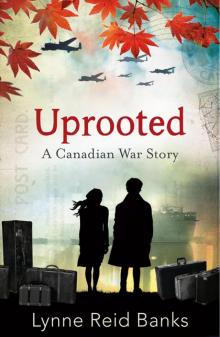 Uprooted - a Canadian War Story
Uprooted - a Canadian War Story The Backward Shadow
The Backward Shadow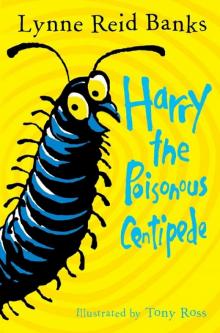 Harry the Poisonous Centipede: A Story to Make You Squirm
Harry the Poisonous Centipede: A Story to Make You Squirm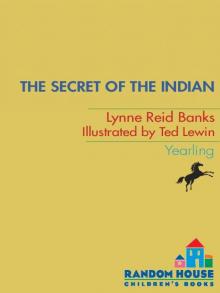 The Secret of the Indian (The Indian in the Cupboard)
The Secret of the Indian (The Indian in the Cupboard)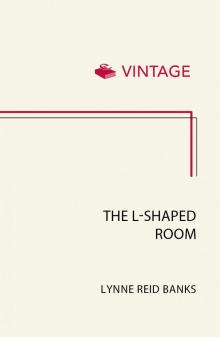 The L-Shaped Room
The L-Shaped Room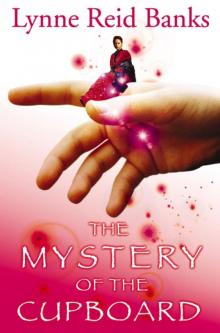 The Mystery of the Cupboard
The Mystery of the Cupboard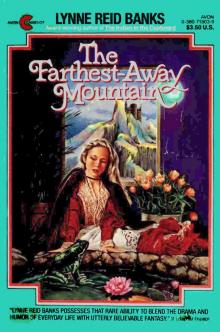 The Farthest-Away Mountain
The Farthest-Away Mountain Harry the Poisonous Centipede Goes to Sea
Harry the Poisonous Centipede Goes to Sea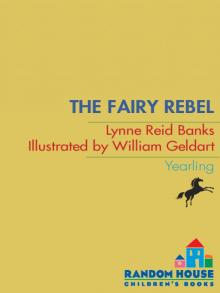 The Fairy Rebel
The Fairy Rebel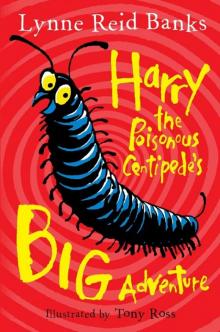 Harry the Poisonous Centipede's Big Adventure: Another Story to Make You Squirm
Harry the Poisonous Centipede's Big Adventure: Another Story to Make You Squirm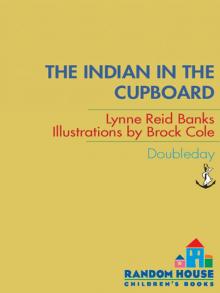 The Indian in the Cupboard
The Indian in the Cupboard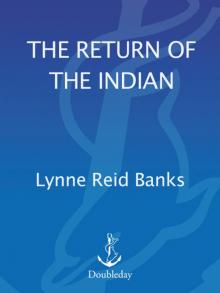 The Return of the Indian
The Return of the Indian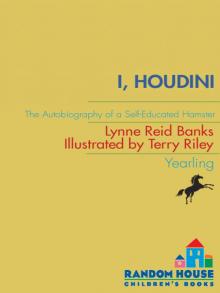 I, Houdini
I, Houdini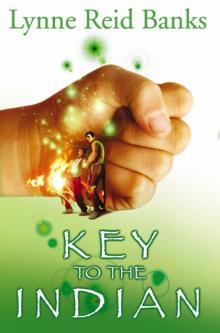 The Key to the Indian
The Key to the Indian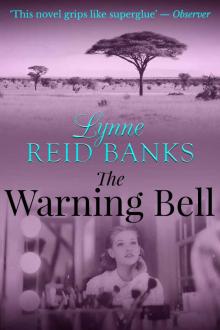 The Warning Bell
The Warning Bell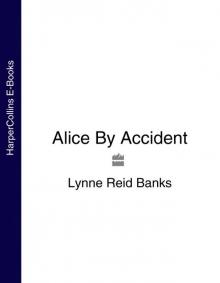 Alice by Accident
Alice by Accident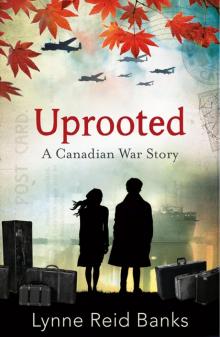 Uprooted
Uprooted Writing On the Wall
Writing On the Wall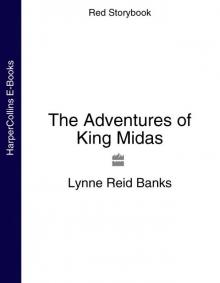 The Adventures of King Midas (Red Storybook)
The Adventures of King Midas (Red Storybook)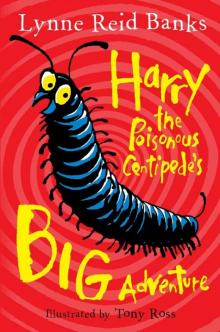 Harry the Poisonous Centipede's Big Adventure
Harry the Poisonous Centipede's Big Adventure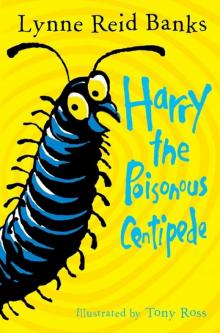 Harry the Poisonous Centipede
Harry the Poisonous Centipede The Dungeon
The Dungeon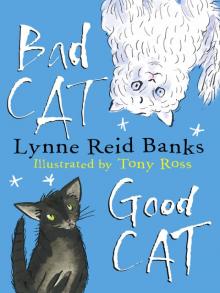 Bad Cat, Good Cat
Bad Cat, Good Cat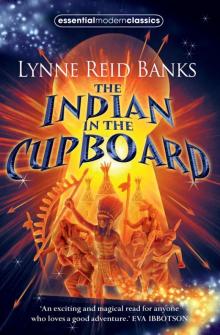 The Indian in the Cupboard (Essential Modern Classics, Book 1)
The Indian in the Cupboard (Essential Modern Classics, Book 1)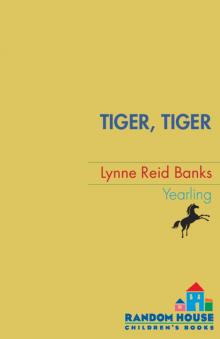 Tiger, Tiger
Tiger, Tiger